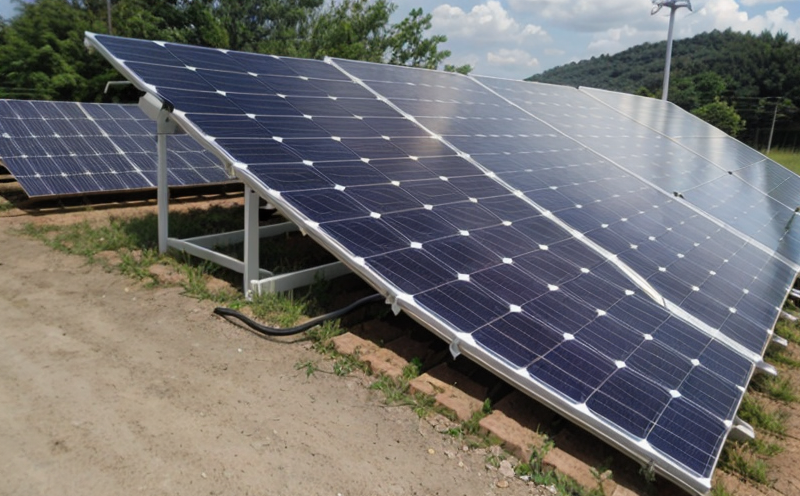IEC 61730-2 Testing of Insulation Materials in PV Modules
The IEC 61730 series of standards provides a framework for the testing and certification of photovoltaic (PV) modules, ensuring their safety, performance, and reliability. Among these standards, IEC 61730-2 specifically addresses the electrical insulation materials used in PV modules. This standard is critical for manufacturers to ensure that insulating materials meet stringent safety requirements, which are essential for preventing dangerous faults or failures within the module.
The testing of insulation materials under IEC 61730-2 involves a series of rigorous procedures aimed at evaluating the electrical performance and mechanical integrity of these components. The primary focus is on ensuring that insulating materials can withstand high voltages without degradation, which is crucial for preventing arc faults or other hazardous conditions. The standard also considers environmental factors such as temperature cycling and humidity to simulate real-world operating conditions.
The testing protocol outlined in IEC 61730-2 includes several key steps. Initially, the insulation material must be cut into specimens that are representative of those used within PV modules. These specimens undergo a variety of tests to assess their electrical properties under different stress conditions. One of the most critical aspects is the voltage withstand test, where the specimen is subjected to high voltages for extended periods to ensure it does not break down or exhibit signs of aging.
Another important aspect is the measurement of dielectric strength and breakdown voltage. This involves applying increasing levels of electrical stress until the material breaks down or exhibits other signs of failure. The results of these tests are crucial in determining whether the insulation can safely operate under typical service conditions without posing a risk to personnel or equipment.
The standard also requires that specimens be tested for their ability to withstand mechanical stresses, such as those caused by thermal expansion and contraction within the module. This ensures that the insulating material remains intact even when subjected to significant temperature variations. Additionally, the tests include evaluation of long-term stability under environmental conditions like humidity and UV exposure.
The data collected from these tests is meticulously documented and used to generate a detailed report that outlines the performance characteristics of the insulation materials. This information is vital for manufacturers as it provides critical insights into the reliability and safety of their products, ensuring compliance with international standards and regulatory requirements.
Scope and Methodology
The scope of IEC 61730-2 testing encompasses a wide range of electrical insulation materials commonly used in photovoltaic modules. This includes materials such as polyvinyl chloride (PVC), ethylene-vinyl acetate (EVA), and other polymer-based compounds that are integral to the construction of PV modules. The methodology outlined in this standard provides comprehensive guidelines for testing these materials under various conditions, ensuring they meet stringent safety requirements.
The first step in the testing process is selecting appropriate specimens from the insulation material to be tested. These specimens must be representative of those used within actual PV modules and should reflect typical manufacturing processes. Once selected, the specimens undergo a series of electrical tests designed to evaluate their ability to withstand high voltages without failure. This involves subjecting the specimens to progressively higher voltage levels until they break down or exhibit other signs of degradation.
Another critical aspect is measuring the dielectric strength and breakdown voltage of the insulation material. This test assesses the maximum voltage that can be applied before the material breaks down, providing valuable insights into its electrical performance under stress. Additionally, the standard requires testing for long-term stability under environmental conditions such as humidity and UV exposure to ensure the material remains reliable over extended periods.
The mechanical properties of the insulation materials are also evaluated by subjecting them to thermal cycling tests. These tests simulate real-world operating conditions where modules may experience significant temperature variations. By exposing the specimens to these cycles, manufacturers can assess whether the insulating material maintains its integrity and electrical performance under such conditions. This ensures that the material remains safe and effective throughout the module's operational life.
The comprehensive approach taken in IEC 61730-2 testing provides a robust framework for ensuring the safety and reliability of insulation materials used in PV modules. By following these rigorous procedures, manufacturers can ensure their products meet international standards and regulatory requirements, thereby enhancing trust and confidence among stakeholders.
Benefits
- Safety Assurance: Ensures that insulating materials do not break down under high voltage conditions, reducing the risk of electrical faults or hazards.
- Regulatory Compliance: Helps manufacturers meet stringent international standards and regulatory requirements for PV module safety.
- Increased Reliability: Enhances the overall reliability of PV modules by ensuring that insulation materials maintain their integrity under various environmental conditions.
- Improved Quality Control: Provides detailed documentation of test results, which can be used to improve manufacturing processes and enhance product quality.
- Enhanced Reputation: Demonstrates a commitment to safety and quality, enhancing the reputation of manufacturers in the industry.
- Cost Savings: By identifying potential issues early in the development process, companies can avoid costly recalls or product failures later on.





